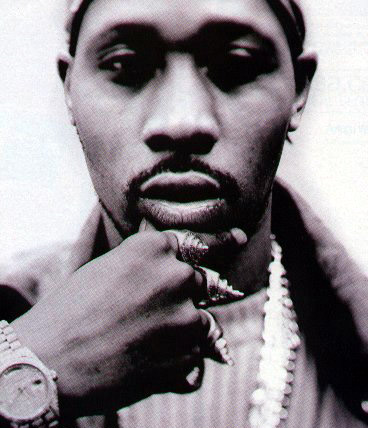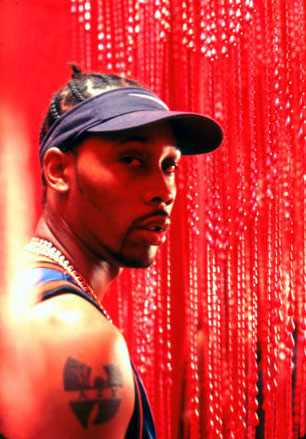Sala Bianca h 23

Sometimes, the first lesson learnt by an artist is the most important.
In 1991, young
Robert Diggs, calling himself
Prince Rakeem, released a commercial-sounding rap single called On it he spit some typical boasts over a chorus of giggling fly girls.
Thesingle caught a brick, and Diggs never made a typical-sounding record again.
Since then, Diggs---AKA the
The Rzarector The Abbott and Bobby Digital---has consistently bent our ears, spitting tilted tales over lopsided loops.
Whether he's making beats or rapping; sampling Memphis soul man Syl Johnson or recording live violin; working with his beloved
Wu-Tang Clan or rap stars like
the Notorious B.I.G. or Cypress Hill;
with reggae talent
Suga Bang Bang or rap supergroup
Tha Gravediggaz; with Icelandic icon
Bjork or
Wu-affiliates Sunz of Man or
Killa Army; or even blitzing breakbeats for b-ball b-boy Shaquille O'Neal,
always opens up strange, new worlds of sound and administers unremitting rhythm, "like a vortex straight to your cerebral cortex" as he might say.
In that tradition comes the discursive , the second chapter of 's alter-ego
Bobby Digital.
Most MCs write rhymes to prove that they come correct.
On this LP released by KOCH Entertainment/ , shows Bobby BECOMING correct.
"
With this album Bobby is making a closer transition to ," explains the super-producer.
"He's starting to activate his higher consciousness.We see Bobby growing up in Brooklyn, moving to Shaolin, and going through enlightening experiences: dealing with music, drugs, women and street brawls."
Club single "Show U Love" opens the album with a deceptively calm anthem of street consciousness, but it's the catchy, organ-tinged that should open ears over the airwaves as Bobby spits some Latin-love jones.
Wu-superman
Method Man drops in to lay some Shaolin sleaze on the sex-gun fantasy
Of course, it's always been songs that explore his characters' internal psychology that really set 's creative wheels spinning.
"Brooklyn Babies," with its twittering synths and accelerating tempo, provides an opportunity to go inside his own dome.
As for the line between the artist and his alter-ego, explains that it's "left for the listener to decipher.
Onemay say it's all fiction while another may say it's all real.
It's artistically intertwined.
"OnBobby Digital 2, we have a man unconscious who's blindly enjoying society's sweet-to-mouth, but (feeling) bitter-to-the-heart.
Yetin the end, the bitterness in Bobby's heart leads him to realization."
Some of that realization comes on a sweet-and-sour song awash with angry rhymes atop poignant pianos.
Thesound expertly evokes the beats on the Wu's debut Enter the Wu-Tang: , and will no doubt appeal to fans of the early Shaolin sound.
"It is actually produced by the fifth pupil, Mathematics," explains, referring to one of the Wu-Tang's chief in-house producers.
"He is one to whom I turn to be reminded of the foundating Wu-Tang style of production. He works with the , a classic Wu-Tang weapon.
It was the sampling machine I used on 85 of my first hundred released beats."
gets back to other old stomping grounds on the swinging "Digi Electronics," which evokes the sing-songy street styles of the Gravediggaz.
Finally, the insidious opens the album's closing trio of songs, which deal with definitions of manhood and man-woman relationships.
features the soulful performance of the female Los Angeles vocal quartet
Intrigue.
As hip-hop comes under consistent fire for sexism, unapologetically writes about conflicts between men and women from his personal experience.
"The two ways I write about women reflect the two attitudes you can find in a woman," he offers.
"I know a man can search the universe and not find the beautiful superb dynamic love and warmth that exist in a good woman.
Yet also he can't find the scorn, deceit and ugliness that is found in a wicked woman.So I write about both... with love and understanding."
Specifically, he writes a sequel to a song from the first Bobby Digital album.
Listening to this track is akin to overhearing a frightful family feud in a neighbor's apartment.
"It's very offensive to women," explains.
"On the woman was telling Bobby that he wasn't shit, and his money, his car, his mother and family ain't shit.
It showed she had no respect or appreciation for him. On this song he starts with the same regard for her.
" Calling the song "a reversal," one of hip-hop's foremost writers travels without fear into a sphere of great stress--the breakdown of family ties--and reports what he finds.
Over 15 tracks, is joined by
GZA, Master Killer, ODB and Method Man of the Wu-Tang Clan, plus Killa Army, Black Nights, Shyheim, Sunz of Man and Royal Fam.
And he never sounds like anything less than an organic original the whole time.
as Bobby Digital’s The Digital Bullet hits the streets August 28, 2001 on KOCH Records / In The Paint.
 RZA Discography
RZA Discography
-
Ohh, I Love You Rakeem, Tommy Boy, 1991
:
36 Chambers, RCA, 1993
,
6 Feet Deep, BMG/Gee Street, 1995
,
Tical, Uni/Def Jam, 1994
:
Return to the 36 Chambers: The Dirty Version, Elektra Records, 1995
Only Built 4 Cuban Linx, BMG/RCA, 1995
,
Liquid Swords, Uni/Geffen Records, 1995
,
Ironman, Epic Records, 1996
Forever, Loud, 1997
,
Tical Vol. 2-Judgment Day, Uni/Def Jam, 1998
, The Swarm, EMD/Priority, 1998
In Stereo, Gee Street, 1999
,
soundtrack, Sony/Epic, 2000
,
Supreme Clientele, Epic Records, 2000
,
Loud Records, 2000
,
Chapter II, Wu-Tang/Priority Records, 2001
, T
he Digital Bullet, Koch, 2001





 Propop ?!?!?
Propop ?!?!?
 Next Event
Next Event
 Hip Hop Festivals
Hip Hop Festivals
 Links
Links
 Sometimes, the first lesson learnt by an artist is the most important.
In 1991, young Robert Diggs, calling himself Prince Rakeem, released a commercial-sounding rap single called On it he spit some typical boasts over a chorus of giggling fly girls.
Sometimes, the first lesson learnt by an artist is the most important.
In 1991, young Robert Diggs, calling himself Prince Rakeem, released a commercial-sounding rap single called On it he spit some typical boasts over a chorus of giggling fly girls.
